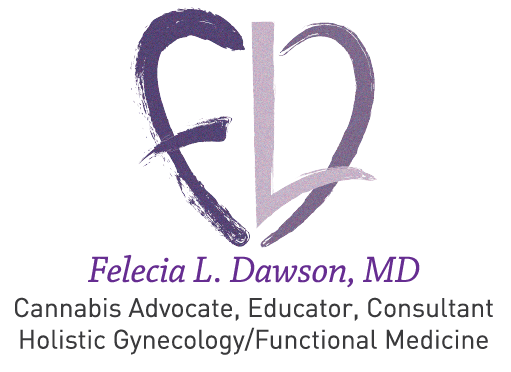Cannabis is a complex, intelligent plant that appears to have been designed to interact with our body via the endocannabinoid system (ECS). The ECS is present in all humans and mammals. It helps us handle mental and physiologic stress. It helps us maintain internal balance. The ECS helps us with cognition, memory, digestion, movement, balance, immune response, appetite, pain reduction, neuroprotection, blood pressure, heart rate, bone growth and well being. Our ECS is comprised of enzymes, endocannabinoids and receptors. This system is distributed throughout our bodies. We produce a baseline of endocannabinoids. This is called our “endocannabinoid tone”. Additional endocannabinoids are created as they are needed with help of enzymes. They then stimulate the receptors and enable the biologic actions described above. Once they are no longer needed, endocannabioids are broken down by more enzymes. When our ECS is not working properly, due to genetics, trauma, nutrition, or lifestyle, we are more prone to experience disease. Preliminary research confirms that many autoimmune disorders, neurodegenerative diseases, mood disorders and cancer, for example, are due to an endocannabinoid deficiency. This is why these conditions often respond to cannabis supplementation.
Cannabis contains over 700 chemical compounds. These include over 140 cannabinoids. The most famous cannabinoids are THC (tetrahydrocannabinol) and CBD (cannabidiol). There are over 200 terpenes in cannabis. Terpenes give cannabis and other plants their aroma and flavor. Cannabinoids do not have an odor or flavor on their own. Terpenes give cannabis it’s aroma and affects our mood. Terpenes are the most common plant chemicals found in nature. At least 30,000 have been identified. They are present in cannabis, fruit, vegetables and spices.
We have come to learn that there are other plants capable of stimulating our ECS besides cannabis. This helps explain why plants have been our main source of medicine and nutrition throughout human history. Black pepper, lemon balm, cloves and hops (the closest plant relative to cannabis) all affect the ECS. The terpene shared by them all is beta-caryophyllene. It’s also the most abundant terpene in cannabis. Beta-caryophyllene is a potent anti-inflammatory and works at our cannabinoid 2 receptor (CB2).
Another useful non-cannabis plant that stimulates our ECS is echinacea. Some of its chemical constituents’ structure look very similar to our endocannabinoids. It acts at our two main cannabinoid receptors (CB1, CB2). It is used to fight the common cold and as an immunity booster.
Ginger, apples and blackberries affect our ECS due to a flavonoid they contain. The flavonoid inhibits the breakdown of one our endocannabinoids. When the enzyme is prevented from doing its job, our endocannabinoid level rises and so does our well being. Flavonoids are also antioxidants and help prevent cancer. Other non-cannabis plants that boost our endocannabinoid levels by inhibiting its breakdown by the enzyme include maca (also know as the Peruvian ginseng) and chocolate. We knew there was a reason why we like dark chocolate so much!
Curcumin, a component of the spice tumeric, is a potent stimulator of our cannabinoid 2 receptors. It is anti-inflammatory and an antioxidant. Lastly, black truffles have been found to have enzymes and endocannabinoids. Thes endocannabinoids activate both of our cannabinoid receptors as well.
Thus, there are many non-cannabis plants that stimulate our ECS. In addition, to eating a colorful, varied, mostly plant-based diet we need a few other things to have a healthy ECS. These include adequate sleep (8-9 hours/day), omega 3-fatty acids and stress management. Ninety-five percent of Americans are deficient in omega 3-fatty acids. These good fats are found in fish oil, hemp and walnuts. Algae-derived omega 3-fatty acids are also a good source. Omega 3-fatty acids form the backbone of our endocannabinoids. While short term stress is easily dealt with by our ECS, chronic stress hinders it.
If you are not quite ready to take the cannabis plunge, increase your intake of non-cannabis plants and spices. You can find several in easy to use tinctures here. They have been composed to help with sleep (RELAX), allergies (BREATHE), pain (RELIEF) and general well-being (FOUNDATION). The alcohol based tincture is plant-based and is placed beneath your tongue. Try them here and take care of your ECS!


